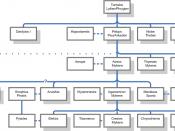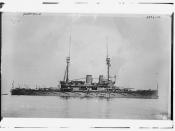"Pity and Awe, reconciliation, exaltation and a sense of emotion purged and purified thereby"1. As this quote from Aristotle's Poetics states, a tragedy must arouse feelings of pity and fear, thus producing a catharsis of these emotions in the audience. In order to arouse the emotions of the audience or reader, writers must produce characters that are known as tragic heroes. A tragic hero is characterized as the hero of a tragedy who is usually well known or prosperous, involves a protagonist who is better than ordinary people, and are neither completely virtuous nor villainous. The most important characteristic of the tragic hero is that he or she must come to a downfall as a result from an error in judgment or a fatal character flaw. Creon, Antigone, and Agamemnon are the tragic heroes in Sophocles' Antigone and Aeschylus' Agamemnon. The tragic heroes of Antigone and Agamemnon compare and contrast.
Royal or noble status is common to tragic heroes. In the two tragedies, characters of royal or noble status were usually the most important characters in the play. Their high rank in society and influence on the less noble or peasant class often lead to their excessive pride or hubris. In the play Antigone, Creon exhibits his hubris by refusing to listen to others. After being confronted by both Tieresias the prophet, the Sentry, and his own son Haimon, Creon refuses to submit to god's law due to his hubris. God's law declares that all men deserve a proper burial and Creon passes a law stating it a crime to bury Antigone's brother, Polyneices, because he considers him a traitor. Creon's opposing character, Antigone, exhibits the same hubris. On the opposing side of the argument, Antigone feels that her brother deserves a proper burial. The character feels so strongly towards...


